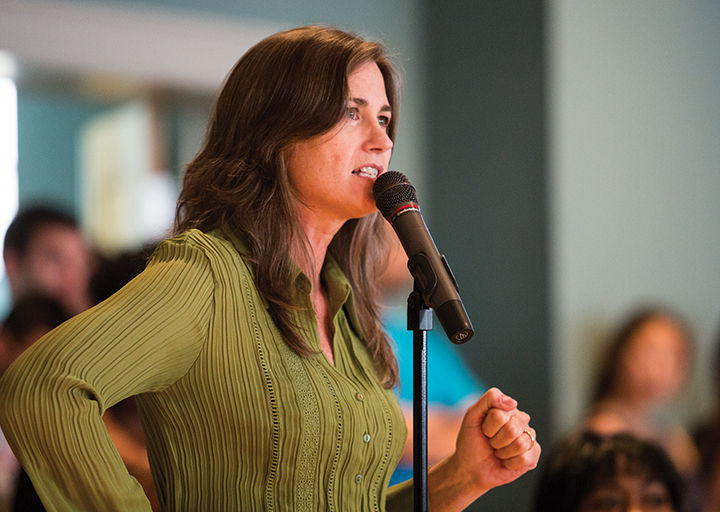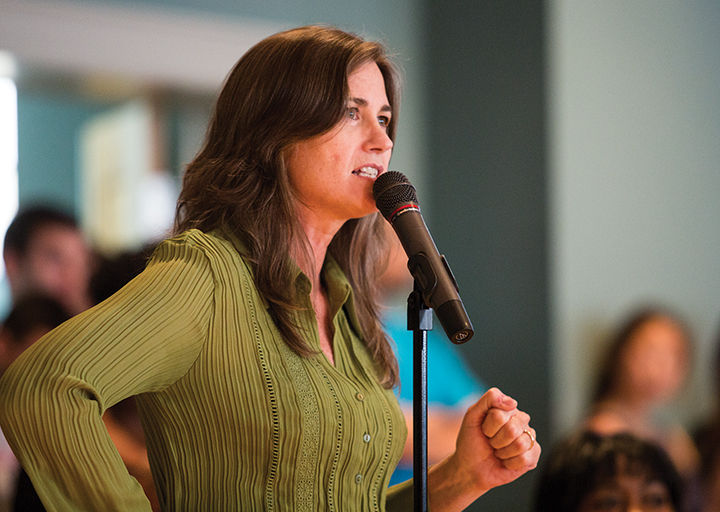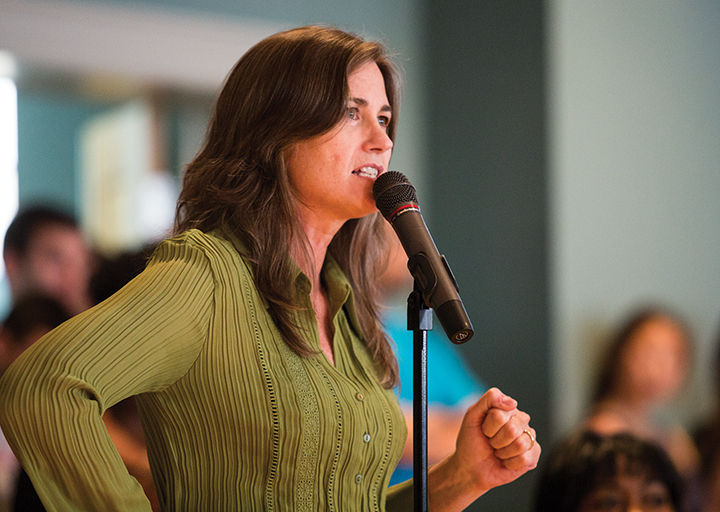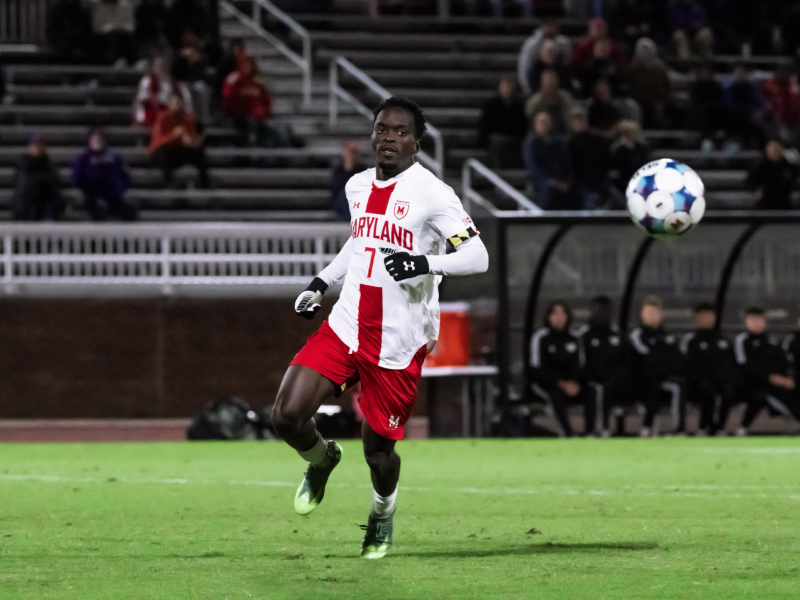As an orientation leader, Bethel Etta helps students through academic advising and takes them to their first meal in the South Campus Dining Hall. She talks to them about life at the University of Maryland, from school workloads to the party scene.
But one of the topics not broached by Etta or this university’s two-day orientation program is sexual misconduct.
“The sexual misconduct policy should be mentioned,” said the junior English and government and politics major. “Sexual assault is pretty common in college, and it’s important that students coming into the university are aware that’s it’s not tolerated from the moment they step on campus, and if it does happen, they should know where to go for help.”
Orientation Director Gerry Strumpf said orientation can often be an information overload, and officials don’t want to overwhelm incoming students.
“You know Maslow’s Hierarchy of Needs?” she said. “When you first get here, you’ve got to worry about your physiological and safety needs to get up higher to your emotional needs. We see our summer programs as meeting those basic needs: ‘Where am I gonna sleep, where am I gonna eat and what classes am I going to take?’”
Strumpf said they do not go over this university’s sexual misconduct policy during orientation, and incoming students learn about it during an online training course.
The hourlong training, which launched last year, aims to teach students what is prohibited under the policy, the consequences of violating the policy and what resources and reporting options are available, according to the objectives listed at the start of the program.
But new students did not receive an email with instructions for completing the training until Sept. 1, the day after classes started and six days after move-in began. They have until Oct. 2 to complete the training.
As of Sept. 17, 35 percent of students who were sent the training completed it, said Catherine Carroll, this university’s Office of Civil Rights and Sexual Misconduct director.
Almost 20 percent of campus sexual assaults take place in September, according to the 2007 Campus Sexual Assault Study.
Freshman Jack Vigneron, who did the training two weeks into school, said it makes him nervous that not all of his peers are required to have completed it by this point. Vigneron said there was no mention of sexual misconduct at his orientation.
“Some people might not know what sexual misconduct entails or how to prevent or stop it,” said Vigneron, who is enrolled in letters and sciences. “Not everyone is educated about it, and that’s not a good thing.”
Freshman Jade Loewenstein said though she has already taken the online training — unlike the two girls eating lunch with her at Stamp Student Union on Wednesday — she found it dry.
“It would’ve been better to hear about it at orientation from people our own age,” she said. “It would’ve stuck more. [The training] was just words on a screen and some guy talking at me. I wasn’t paying attention.”
But Strumpf said a large group setting isn’t the right place to discuss sexual misconduct. A better place to talk about those kinds of issues, she said, would be in UNIV 100: The Student in the University.
This fall, 10 sections of the college transition class are taking part in a pilot program that will broach the subject of sexual misconduct on the campus, said Strumpf, who teaches the class.
Students in these sections will get bystander intervention training from this university’s Campus Advocates Respond and Educate to Stop Violence peer educators, with Strumpf’s class scheduled to hear from them on Oct. 21.
“We’re not going to change the world by talking to 4,000 students at one time and lecturing at them,” she said. “When they come to UNIV, we’re going to talk about it at a very high level, which I think is good education.”
About 46 percent of this university’s freshman class enrolled in a UNIV course this fall, according to the schedule of classes.
At the University of Michigan, freshman orientation includes a skit performance for all first-year students “about sexual and intimate partner violence that addresses societal myths, bystander intervention, and men’s role in the movement,” according to its website.
Towson University takes a similar approach, and a 2013 student survey conducted after orientation showed that 70 percent of respondents “learned something new about what constitutes sexual assault,” said Jana Varwig, Towson’s associate vice president of academic affairs.
“It’s important for students to really understand what consent means and to understand what sexual assault is and to know it at the very beginning of when they get to school,” Varwig said. “Students can be victims of sexual assault as soon as they get to school.”
This university’s orientation also features skits put on by orientation advisors. Subjects of this summer’s performances included how to deal with roommates, academic dishonesty, and alcohol and drugs, Etta said.
“They talked about drugs and drinking safely, but they didn’t talk about sexual misconduct,” said Rachael Gottbetter, a freshman enrolled in letters and sciences. “A lot of people don’t know about it, especially guys, and they need to know not to do certain things.”
Carroll said her office is mentioned during orientation when students are presented with the resources available to them, but she hopes to have “more of a footprint” during welcome events in the future.
In an April 2014 Department of Education document, the Office of Civil Rights states that to “ensure that students understand their rights under Title IX, a school should provide age-appropriate training to its students regarding Title IX and sexual violence. … The school may want to include this training in its orientation programs for new students.”
Strumpf said her office plans to incorporate the topic of sexual misconduct into next summer’s orientations, but there are not yet concrete designs of what that will look like.
“Again, it’s not going to be someone talking at students; I envision it in a smaller group setting where we talk about responsibility as a citizen here,” Strumpf said. “Also — and I’m going to be gender-specific — but I think it’s more a women’s issue, that they’ve got to be really careful.”
Orientation is “the entry point for students coming to campus, and the emphasis on these issues has to be prominent and at the forefront of what we’re doing,” Carroll said. “We have to have a presence there.”
Title IX Officer Catherine Carroll responds to a student question at a town hall meeting to discuss issues of racism and sexual violence on the campus and in Greek Life on April 2, 2015.
Title IX Officer Catherine Carroll responds to a student question at a town hall meeting to discuss issues of racism and sexual violence on the campus and in Greek Life on April 2, 2015.





